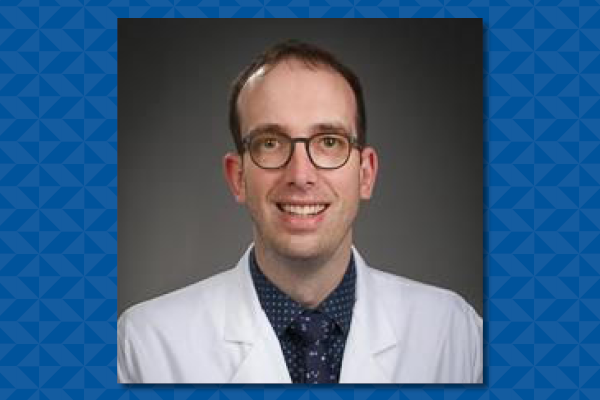
Joshua Parsons, MD, credits his involvement with the Duke Department of Medicine’s Fellow Research Academy (FRA) as the key factor in his successful application for the National Institute of Health (NIH) K08: Clinical Investigator Award.
Dr. Parsons, a former clinical investigator pathway fellow and current assistant professor of medicine with the Division of Infectious Diseases has a PhD in biochemistry, which led him to his interest in the research topic of why some patients do well on antibiotics while others do poorly.
“Most of the work today is focused on how different antibiotic choice effects efficacy, but my work focuses on how differences in the bacteria shape how well people do when they’re on antibiotics,” said Parsons. “There are two aims: one is to examine how differences in bacteria genome affect susceptibility to antibiotics, and the second is to find out how changes in the Staphlyococcus aureus genome are related to clinical outcomes in humans.”
Dr. Parsons explained the importance of the research, saying that if it’s possible to detect in the micro-lab which strains of Staphylococcus aureus are likely to cause worse disease, practitioners can identify patients at risk of poor outcomes and adjust clinical management accordingly.
Resources
Inspired by the myriad of resources available to him at Duke, Dr. Parsons found interest in Duke’s immense S. aureus bacteremia group – prospective cohort study” (SABG-PCS) biorepository, which is a collection of S. aureus clinical bloodstream isolates from patients at Duke. “It’s the largest biorepositiory of S. aureus bloodstream isolates in the world that’s not available anywhere else, so that’s a real gold mine,” said Parsons. His mentor, Vance Fowler, MD, created this resource over the past 30 years. Parsons said his mentor makes that resource available to anybody with a good clinical question.
The K08 award is provided to individuals with a clinical doctoral degree and an intensive, supervised, research career development experience. According to the NIH, the grant supports individuals on a path to a productive, independent research career. Dr. Parsons received a score of 13 on his initial submission. With 10 being a perfect score, his grant will likely be funded.
Mentoring
The FRA aims to support the goals of aspiring researchers through three interrelated components, one of which is longitudinal grant development
The process that goes into writing a research grant isn’t openly taught to trainees, making it hard for most to find a resource that can guide them if they do not take advantage of the resources offered, such as the FRA.
“One of the unique things about the FRA is that it breaks things down into certain stages. Each component of the grant is broken down and systematically taught to you. It’s really good to have an expert to guide you,” said Parsons. “I did the FRA three years in a row, and it was the first time I’d been exposed to the systematic analysis of how you write grants and how you approach them.”
The FRA grant development workshop allows fellows to develop their own grants through large and small group work. Fellows who are ready to begin preparing career development award proposals participate in a fellow-focused grant incubator program led by the DOM Research Development Council team.
Community
An additional benefit of the FRA is that it complements each research fellow’s existing mentor team by providing tailored training and a sense of community with other research fellows across the department.
“The amount of time Drs. Irina Mokrova and John Williams spent going through my grant and helping improve it was just astonishing,” said Parsons. “Sometimes, you give people things to read, and you can tell they just skimmed over it and didn’t really think about it, but they both gave me thoughtful comments and kept me encouraged and on target with dates.”
Fellows are encouraged to participate in the FRA throughout their designated research years, with no duration limit. Dr. Parsons encourages fellows to take advantage of the many tools offered through the FRA. “It’s an amazing program that the department has built over the last few years.”
Applications for the 2024-25 edition of the FRA will be opening in mid to late August 2024. For any additional details or questions, please email Saini Pillai, MBA.